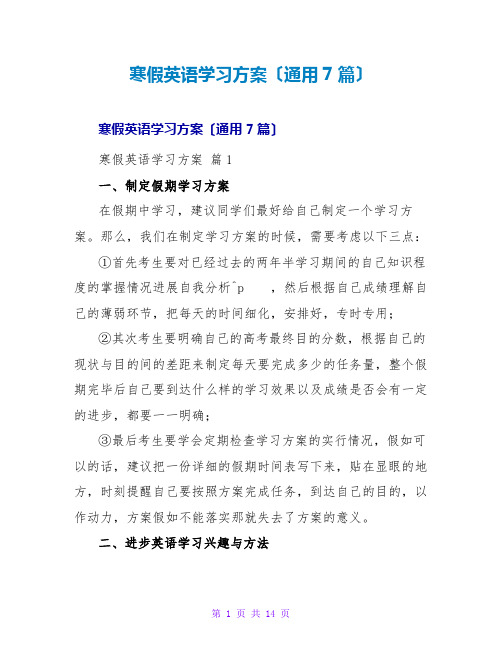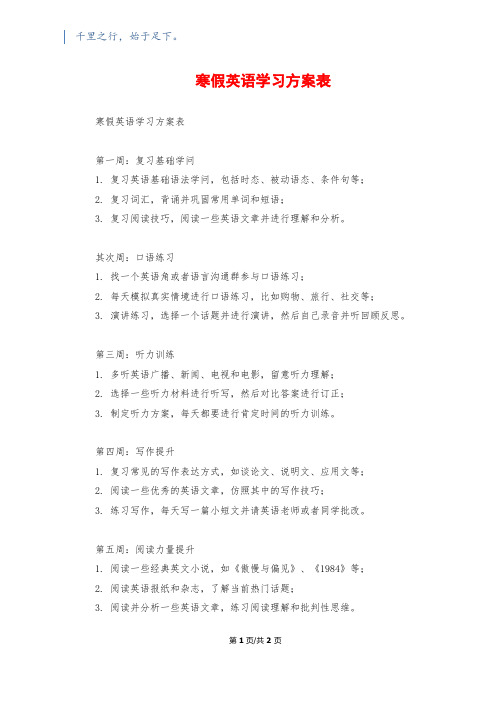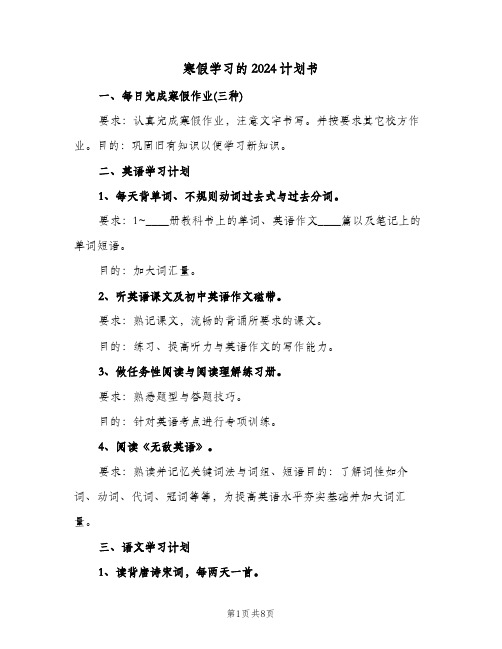英语寒假学习计划书一览
2024年寒假英语学习计划模板(五篇)

2024年寒假英语学习计划模板1、每一天进行一小时以上的体育锻炼(最好是室外、能集体运动就更棒了)。
2、要关心时事新闻,关心社会生活(可通过电视或报刊)。
3、每一天做一些力所能及的家务,帮助父母、锻炼自己(比如洗碗、取报、整理房间等)。
4、每一天和父母做必要的交流(可在餐桌上和一起看电视时)。
5、读一本名着,古今中外皆可。
6、每一天保质保量地完成寒假作业。
寒假计划时间表安排可参考如下:7:____起床8:00做寒假作业或复习上学期11:00吃饭11:30娱乐13:00做寒假作业或预习15:00看课外书16:30休息17:00吃饭18:00预习新课20:30娱乐21:30睡觉2024年寒假英语学习计划模板(二)一、计划实施的目标:1、提高自己在语文、数学等方面的学习能力。
2、加强运动,提高身体素质。
3、学会做简单的家常菜。
二、具体措施:1、针对自己的薄弱学科的学习态度、学习方法、学习目标进行反思,调整。
2、在家长的指导下,写好自己切实可行的寒假生活、学习计划。
(安排好每天复习进度的明细内容)3、把练习卷上做正确的题目进行整理,确认自己已经掌握了哪些知识,具备了哪些运用能力,树立自己对本学科的信心。
4、把练习卷上做错的题目进行整理、抄录,打开教科书,逐题进行分析,找到错误的关键之处,进行认真的订正后,再到教材上找到相关类型的题目,进行练习、强化。
(尽可能用自己的力量解决问题)5、遇到无法解决的困难,按教科书的学习顺序进行梳理罗列。
了解自己学习问题的共性薄弱点,然后可以请老师一起帮助解决。
6、每周二次带着学科的不懂之处和老师一起分析、解决问题。
回家后运用老师解决问题的方法进行自我强化练习,填补自己的学习漏洞。
(这一点必须按照教材由浅入深的学习顺序,切不可东一榔头西一棒的无序)7、每次完成习题的订正,将错题订正的全过程,牢牢地记在脑海里(背出),渐渐地形成解题方法的量的积累8、一星期打两次球,游三次泳,增加运动,提高体能。
英文版寒假学习计划

英文版寒假学习计划The winter vacation is approaching, and it's an excellent opportunity for students to make the most of their time by setting up a study plan. A well-structured winter vacation study plan can help students review and consolidate what they have learned in the previous semester and prepare for the challenges ahead. Therefore, it's essential to make the most of this time for academic enrichment and personal growth.In this article, we will outline a comprehensive study plan for the winter vacation, covering various subjects and activities to ensure a well-rounded and productive break. The study plan will encompass a broad range of academic, extracurricular, and self-improvement activities to help students achieve their academic goals and cultivate essential skills for the future.Language and Literature1. Reading List: The winter vacation is an ideal time to catch up on reading. Choose a diverse range of books, including literature classics, contemporary fiction, and non-fiction works on topics of interest. Aim to read at least two books per week and keep a reading journal to reflect on the themes, characters, and writing style.2. Writing Practice: Allocate time for daily writing exercises to hone your composition and creative writing skills. Experiment with different writing styles, such as descriptive, narrative, persuasive, and expository writing. Additionally, consider contributing to a blog or literary magazine to showcase your writing prowess.3. Language Learning: Dedicate time for language learning, whether it's improving your proficiency in a foreign language or enhancing your vocabulary and grammar skills in your native tongue. Online language courses, flashcards, and language exchange programs can be valuable resources for language acquisition.STEM Subjects1. Science Experiments: Conduct simple science experiments at home to explore scientific principles and phenomena. Utilize online resources and experiment kits to perform hands-on experiments in physics, chemistry, biology, and environmental science. Document your findings and observations in a scientific journal.2. Math Practice: Review essential math concepts and practice problem-solving skills through daily math exercises and worksheets. Explore math-related puzzles, games, and challenges to sharpen your mathematical reasoning and critical thinking abilities.3. Coding and Robotics: Engage in coding projects and robotics activities to develop computational thinking and programming skills. Participate in online coding competitions, explore coding platforms, and build your own robotic creations using kits and tutorials. Social Sciences and Humanities1. Historical Research: Choose a historical period or event to delve into through independent research and analysis. Utilize primary and secondary sources, documentaries, and online archives to deepen your understanding of pivotal historical moments and their impact on society.2. Geography and World Cultures: Explore the diverse cultures and geographical features of different countries and regions through virtual tours, documentaries, and cultural workshops. Develop a multimedia presentation or digital project to showcase your knowledge of global geography and cultural diversity.3. Current Events and Debates: Stay informed about current events and global issues by following reputable news sources and engaging in discussions with peers and family members. Organize a debate club or virtual discussion group to exchange viewpoints on contemporary societal, political, and environmental topics.Art and Creativity1. Artistic Expression: Unleash your creativity through visual arts, such as drawing, painting, sculpting, and digital art. Experiment with different art mediums and techniques to create original artwork and express your emotions and ideas visually.2. Music and Performing Arts: Dedicate time to practice a musical instrument, develop your vocal skills, or engage in acting, dancing, or storytelling. Join virtual music ensembles, drama clubs, or dance groups to collaborate with peers and showcase your artistic talents.3. Creativity Challenges: Participate in weekly creativity challenges, such as photo prompts, writing prompts, and art contests, to spark your imagination and expand your creative abilities. Share your creations on social media or creative platforms to receive feedback and inspiration from the online community.Physical and Mental Well-being1. Exercise and Fitness: Incorporate regular physical activity into your daily routine, whether it's through indoor workouts, yoga sessions, or outdoor sports and recreational activities. Stay active and maintain a healthy lifestyle to boost your energy, mood, and overall well-being.2. Mindfulness and Relaxation: Practice mindfulness meditation, deep breathing exercises, and relaxation techniques to reduce stress, improve concentration, and enhance mental clarity. Explore resources on stress management and self-care to prioritize your mental health and inner peace.3. Hobbies and Leisure Activities: Pursue hobbies and leisure activities that bring you joy and fulfillment, such as gardening, cooking, photography, or DIY projects. Engaging in meaningful leisure pursuits can foster creativity, satisfaction, and a sense of accomplishment.Personal Development1. Goal Setting and Reflection: Set specific, achievable goals for the winter vacation and track your progress regularly. Reflect on your strengths, weaknesses, and areas for improvement by maintaining a personal journal and seeking feedback from mentors and peers.2. Skill Building: Identify new skills you'd like to acquire, whether it's learning a musical instrument, mastering a new software program, or developing proficiency in a particular craft or trade. Enroll in online courses, workshops, or apprenticeships to expand your skill set and knowledge base.3. Volunteer and Community Service: Get involved in volunteer opportunities and community service projects to make a positive impact in your local community. Whether it's supporting vulnerable populations, participating in environmental conservation efforts, or assisting local nonprofit organizations, volunteering can foster empathy, leadership, and social responsibility.To ensure the successful implementation of the winter vacation study plan, it's crucial for students to allocate dedicated time slots for each activity, maintain a consistent routine, and stay motivated and disciplined throughout the break. Additionally, seeking support from teachers, mentors, and family members can provide guidance, encouragement, and accountability to help students stay on track and maximize their learning potential.In conclusion, the winter vacation presents an invaluable opportunity for students to engage in purposeful and enriching activities that promote academic growth, personal development, and well-rounded skill acquisition. By following a well-structured study plan encompassing diverse subjects and pursuits, students can make the most of their vacation and emerge with newfound knowledge, skills, and self-awareness to embark on the upcoming semester with confidence and enthusiasm.。
制定英语寒假学习计划书籍

制定英语寒假学习计划书籍I. IntroductionThe winter vacation is a great opportunity for students to enhance their English language skills, catch up on missed topics, and prepare for the upcoming semester. To make the most of this time, I have designed a comprehensive English learning plan that includes reading, writing, listening, and speaking activities. This plan will help me stay engaged with the language and improve my proficiency during the break.II. Reading Goals1. Read at least two novels from different genres: I will select one classic novel and one contemporary novel to broaden my understanding of different writing styles and themes.2. Read at least one non-fiction book related to a topic of interest: I will choose a book on a subject that I find fascinating, such as history, science, or biographies, to expand my knowledge and vocabulary.3. Explore English literature: I will read poems, short stories, and essays from various English authors to familiarize myself with different literary forms.III. Writing Goals1. Write a journal entry every day: I will express my thoughts, feelings, and experiences in English to practice writing in a more personal and informal tone.2. Complete writing prompts: I will respond to writing prompts on different topics, such as my favorite hobbies, a memorable vacation, or a hypothetical scenario, to improve my creative writing skills.3. Practice academic writing: I will write an essay on a topic of my choice, such as the impact of technology on society or the importance of preserving the environment, to enhance my ability to construct coherent arguments and organize my ideas.IV. Listening Goals1. Watch English movies and TV shows with subtitles: I will watch a variety of English-language content to improve my listening comprehension and become familiar with colloquial phrases and accents.2. Listen to English podcasts and news broadcasts: I will listen to podcasts on topics that interest me, such as science, history, or culture, and regularly tune in to English news programs to stay informed about current events.3. Use language learning apps: I will engage with language learning apps that feature listening exercises, such as dictation, listening comprehension quizzes, and audio recordings, to sharpen my listening skills.V. Speaking Goals1. Practice speaking with a language partner: I will find a language exchange partner or joina conversation club to engage in regular conversations in English and receive feedback on my speaking skills.2. Record myself speaking and analyze the recordings: I will record myself speaking on different topics, review the recordings to identify areas for improvement, and work on intonation, pronunciation, and fluency.3. Present a topic in English: I will prepare a short presentation on a subject that interests me and deliver it in front of a small audience to build confidence and improve my public speaking abilities.VI. Vocabulary and Grammar Goals1. Learn new words and phrases: I will make a list of new vocabulary from my reading, writing, and listening activities, and regularly review and incorporate them into my speaking and writing.2. Study grammar rules and practice exercises: I will focus on specific grammar points that I find challenging and complete exercises to reinforce my knowledge and use of grammatical structures.VII. Reflection and Evaluation1. Keep a learning log: I will maintain a learning log to record my progress, insights, challenges, and achievements, as well as to set new goals for the following week.2. Evaluate my language skills: I will assess my improvements in reading, writing, listening, and speaking by comparing my current abilities with the one I had at the beginning of the vacation.3. Seek feedback from teachers or mentors: I will share my work with English teachers or mentors and request constructive feedback on my language skills and learning strategies. VIII. ConclusionThis winter vacation learning plan will provide me with a structured and diverse approach to improving my English language proficiency. By dedicating time every day to reading, writing, listening, and speaking in English, I am confident that I will make significant progress and enter the new semester with renewed confidence and skills. I am excited to embark on this learning journey and am committed to staying disciplined and focused on my goals.。
寒假英语学习计划(通用7篇)

寒假英语学习方案〔通用7篇〕寒假英语学习方案〔通用7篇〕寒假英语学习方案篇1一、制定假期学习方案在假期中学习,建议同学们最好给自己制定一个学习方案。
那么,我们在制定学习方案的时候,需要考虑以下三点:①首先考生要对已经过去的两年半学习期间的自己知识程度的掌握情况进展自我分析^p ,然后根据自己成绩理解自己的薄弱环节,把每天的时间细化,安排好,专时专用;②其次考生要明确自己的高考最终目的分数,根据自己的现状与目的间的差距来制定每天要完成多少的任务量,整个假期完毕后自己要到达什么样的学习效果以及成绩是否会有一定的进步,都要一一明确;③最后考生要学会定期检查学习方案的实行情况,假如可以的话,建议把一份详细的假期时间表写下来,贴在显眼的地方,时刻提醒自己要按照方案完成任务,到达自己的目的,以作动力,方案假如不能落实那就失去了方案的意义。
二、进步英语学习兴趣与方法假期,没有了教师的约束与管理,也没有了同学间学习竞争共同进步的气氛,很容易会懈怠,所以自律很关键。
学习方案能不能顺利完成就需要看是否有学习方法了,只有高效的学习才能事倍功半。
英语是一门语言,语言是文化的一局部,而文化具有非常深沉的底蕴与历史内涵,所以没有语言文化背景,学习英语就会产生障碍。
因为不理解英语的风俗文化,思维方式与历史背景,就会存在一些词汇,俗语等的理解问题。
所以最理想,最实用的方法就是通过阅读大量文章或者名家著作来进步对英语学习的兴趣,同时进步语言词汇的积累,进而进步成绩。
考生可以根据自身情况来适当调整每日的阅读量,可以从每天15分钟的美文阅读来入手,也可以选择有音频的跟读,锻炼口语,模拟发音。
一定要持之以恒,不可半途而废,英语学习是一项着重积累的过程,只有不停的反复记忆与阅读,才可把知识牢牢锁在脑子里,当考试时自然知识全部熟记,成绩也会随之进步。
另外一个重点--笔记。
无论学习什么,都要将所学内容记在笔记本上。
笔记是对所学知识的内容与精华与总结,也就是在复习中应着重看的内容。
寒假英语学习计划表

千里之行,始于足下。
寒假英语学习方案表寒假英语学习方案表第一周:复习基础学问1. 复习英语基础语法学问,包括时态、被动语态、条件句等;2. 复习词汇,背诵并巩固常用单词和短语;3. 复习阅读技巧,阅读一些英语文章并进行理解和分析。
其次周:口语练习1. 找一个英语角或者语言沟通群参与口语练习;2. 每天模拟真实情境进行口语练习,比如购物、旅行、社交等;3. 演讲练习,选择一个话题并进行演讲,然后自己录音并听回顾反思。
第三周:听力训练1. 多听英语广播、新闻、电视和电影,留意听力理解;2. 选择一些听力材料进行听写,然后对比答案进行订正;3. 制定听力方案,每天都要进行肯定时间的听力训练。
第四周:写作提升1. 复习常见的写作表达方式,如谈论文、说明文、应用文等;2. 阅读一些优秀的英语文章,仿照其中的写作技巧;3. 练习写作,每天写一篇小短文并请英语老师或者同学批改。
第五周:阅读力量提升1. 阅读一些经典英文小说,如《傲慢与偏见》、《1984》等;2. 阅读英语报纸和杂志,了解当前热门话题;3. 阅读并分析一些英语文章,练习阅读理解和批判性思维。
第1页/共2页锲而不舍,金石可镂。
第六周:综合力量训练1. 进行模拟考试,模拟考试要包括听力、阅读、写作和口语等部分;2. 对比模拟考试结果,分析自己的薄弱环节并有针对性地进行训练;3. 与其他同学一起进行学习争辩和沟通,相互提高。
第七周:总结和巩固1. 回顾之前的学习方案,对比自己的学习成果进行总结;2. 连续进行口语练习,与英语母语者进行沟通;3. 与同学一起组织英语角活动,共享自己的学习心得和阅历。
这是一个寒假英语学习方案表,期望对你有所挂念。
不过,具体的方案还需要依据个人的状况和实际状况来进行调整。
祝你寒假学习顺当!。
寒假学习的2024计划书(三篇)

寒假学习的2024计划书一、每日完成寒假作业(三种)要求:认真完成寒假作业,注意文字书写。
并按要求其它校方作业。
目的:巩固旧有知识以便学习新知识。
二、英语学习计划1、每天背单词、不规则动词过去式与过去分词。
要求:1~____册教科书上的单词、英语作文____篇以及笔记上的单词短语。
目的:加大词汇量。
2、听英语课文及初中英语作文磁带。
要求:熟记课文,流畅的背诵所要求的课文。
目的:练习、提高听力与英语作文的写作能力。
3、做任务性阅读与阅读理解练习册。
要求:熟悉题型与答题技巧。
目的:针对英语考点进行专项训练。
4、阅读《无敌英语》。
要求:熟读并记忆关键词法与词组、短语目的:了解词性如介词、动词、代词、冠词等等,为提高英语水平夯实基础并加大词汇量。
三、语文学习计划1、读背唐诗宋词,每两天一首。
要求:耳熟能详目的:熟练运用到作文中去,以期熟读唐诗三百首,不会作诗也会吟2、每天做摘抄,读中考满分作文。
要求:不辞寸壤,不弃涓滴目的:建立自己的素材库,以期博观约取,厚积薄发包括:①语言材料A:阅读积累(多读书,一定要先做到眼高手低才能有发展)B:适当看些幽默、相声(要知道民族的才是世界的)C:诗词歌赋必不可少(文化底蕴才是写作的关键)D:古今名人的轶事和历史小故事(议论必须有理有据,有据才能证理)②生活材料可以是生活小窍门、手工小工艺③科技材料可以是新科技、新发明、世界未解之谜注意:处处留心皆学问3、语文基础知识训练要求:对初中阶段的字音、字形与字义必须掌握。
目的:对于中考的基础知识尽量多得分。
4、每天必须写日记。
要求:最少____字,可以一天中文一天英文。
英文日记字数可适当。
目的:就是为了练笔。
5、每天练钢楷两页。
要求:书写下学期的古诗文与钢笔字帖,有道是:文若其人,字若其人寒假学习的2024计划书(二)一、时间安排1、每天的四个____小时保障每天保障做一小时的语文或数学寒假作业;每天保障一小时的无负担课外阅读;每天保障一小时的英语自学;每天保障一小时的户外活动或运动。
英语形式寒假计划表
英语形式寒假计划表
寒假期间,大家都有着不同的计划,学会更好地安排自己的时间是每个人必须学会的技能。
为了帮助大家有效地安排英语学习,下面是一份英语形式的寒假计划表:
1.每天花费90分钟的时间来学习英语,其中30分钟进行课文的阅读,30分钟的时间来复习本学期学过的单词,另外30分钟可以花在练习语法句子上,以加深对英语的理解和熟练度。
2.每天花费30分钟时间进行健身活动,以保持身体健康。
3.每天花费30分钟的时间来参加英语角活动,以提高英语口语表达能力。
4.每周花费60分钟时间,参加英语晚会,通过社交活动,与外国友人交流来提高英语水平。
5.每周花费120分钟时间,进行英语阅读活动,来扩大英语的词汇量,增加学习英语的兴趣。
6.请一位外教辅导,每周花费90分钟时间进行1对1的英语辅导,以获取专业的英语指导。
7.每天花费60分钟的时间来学习新的英语文化,如单词,句式,习俗等,以增强对英语的理解。
以上是本人对于英语形式寒假计划表的建议,希望大家将它付诸实践,做到有计划,规划好自己的英语学习,以期取得更大的进步。
英语学习是一个积累的过程,只有坚持不懈和持之以恒,才能取得很大的进步。
因此,建议大家在进行英语学习时,要保持良好的情
绪,保持努力的状态,专注于英语学习,保持积极的心态,遇到困难不要气馁,多咨询老师,有问题,则认真思考,尝试去解决,认真复习,积累英语知识,让自己更加深入地了解英语。
最后,希望大家在寒假期间,可以有效地安排自己的时间,认真对待英语学习,坚持不懈,最终获得英语的进步和成功。
英语寒假任务计划表
英语寒假任务计划表Winter Break English Language Learning Plan.Reading:Read one novel in English, such as "To Kill a Mockingbird" by Harper Lee or "The Great Gatsby" by F. Scott Fitzgerald.Read a selection of short stories from different genres, such as "The Lottery" by Shirley Jackson and "The Tell-Tale Heart" by Edgar Allan Poe.Read articles from reputable sources, such as The New York Times and BBC News, to stay informed about current events and improve your understanding of global issues.Writing:Write a short story (approximately 500-1000 words)that explores a theme or topic of your choice.Write a letter to a friend or family member in English, describing your experiences and learning over the break.Write a journal each day, reflecting on your reading, writing, and other English language learning activities.Listening:Watch movies and TV shows in English to improve your listening and comprehension skills. Choose movies and shows that are appropriate for your level and interests.Listen to podcasts on a variety of topics, such as news, history, or science.Listen to music in English and pay attention to the lyrics to improve your vocabulary and understanding of idioms.Speaking:Practice speaking English with a friend or family member who is also learning or studying English.Record yourself speaking English and listen to it to identify areas for improvement.Join an online language learning platform that offers live or virtual speaking sessions with other English learners.Other Activities:Use language learning apps such as Duolingo or Babbel to supplement your learning.Attend virtual workshops or classes to improve your English skills in a structured environment.Immerse yourself in English culture by watching English films, reading English literature, and listening to English music.Timeline:Week 1: Focus on reading novels and short stories.Week 2: Practice writing and listening skills.Week 3: Improve speaking and other language learning activities.Week 4: Review and consolidate your learning.Assessment:Self-assessment: Reflect on your progress throughout the break and identify areas where you have improved or need further practice.Feedback from others: Ask a friend, family member, or teacher to provide feedback on your writing and speaking skills.Goals:By the end of winter break, you aim to:Enhance your reading comprehension and critical thinking skills.Improve your writing fluency and accuracy.Increase your listening and speaking confidence.Expand your vocabulary and cultural understanding of the English language.中文回答:英语寒假学习计划表。
四年级英语寒假计划表
四年级英语寒假计划表
寒假时间:2023年1月15日至2023年2月15日
一、学习目标
1.巩固所学知识,提高英语听说读写能力。
2.掌握英语基础语法,增强英语语感。
3.提高词汇量,扩充阅读量。
4.提高英语实际运用能力,为新学期学习做好准备。
二、学习安排
1.每日晨读30分钟,朗读已学过的课文和单词。
2.每天完成一张寒假作业,复习巩固本学期所学内容。
3.每周听录音练习英语口语,培养英语语感。
4.每周阅读一篇英文短文,增加词汇量和阅读量。
5.每周复习和预习新学期即将学习的内容。
三、学习要求
1.坚持每天完成学习任务,不拖延、不懈怠。
2.每天总结所学内容,巩固所学知识。
3.遇到问题及时请教老师或同学,不要不懂装懂。
4.每天朗读英语课文和单词,培养英语语感。
5.每周完成老师布置的作业,认真对待每一项作业。
四、学习奖励
1.寒假期间表现优秀的学生将获得老师颁发的奖状和奖品。
2.学习进步明显的学生将获得老师和家长的表扬和鼓励。
3.寒假作业完成优秀的学生将获得老师和家长的肯定和赞赏。
大学生寒假英语学习计划书(3篇)
大学生寒假英语学习计划书(3篇)大学生寒假英语学习计划书(精选3篇)大学生寒假英语学习计划书篇11.循序渐进&&就是人们按照学科的知识体系和自身的智能条件,系统而有步骤地进行学习。
它要求人们应注重基础,切忌好高骛远,急于求成。
循序渐进的原则体现为:一要打好基础。
二要由易到难。
三要量力而行。
2.熟读精思&&就是要根据记忆和理解的辩证关系,把记忆与理解紧密结合起来,两者不可偏废。
我们知道记忆与理解是密切联系、相辅相成的。
一方面,只有在记忆的基础上进行理解,理解才能透彻;另一方面,只有在理解的参与下进行记忆,记忆才会牢固,熟读,要做到三到:心到、眼到、口到。
精思,要善于提出问题和解决问题,用自我诘难法和众说诘难法去质疑问难。
3.自求自得&&就是要充分发挥学习的主动性和积极性,尽可能挖掘自我内在的学习潜力,培养和提高自学能力。
自求自得的原则要求不要为读书而读书,应当把所学的知识加以消化吸收,变成自己的东西。
4.博约结合&&就是要根据广搏和精研的辩证关系,把广博和精研结合起来,众所周知,博与约的关系是在博的基础上去约,在约的指导下去博,博约结合,相互促进。
坚持博约结合,一是要广泛阅读。
二是精读。
5.知行统一&&就是要根据认识与实践的辩证关系,把学习和实践结合起来,切忌学而不用。
知者行之始,行者知之成,以知为指导的行才能行之有效,脱离知的行则是盲动。
同样,以行验证的知才是真知灼见,脱离行的知则是空知。
因此,知行统一要注重实践:一是要善于在实践中学习,边实践、边学习、边积累。
二是躬行实践,即把学习得来的知识,用在实际工作中,解决实际问题。
单词:毫无疑问是第一关。
大纲标准是4500左右,但是这里面包括很多我们已经认识的词汇,所以真正需要背的只有大约20__左右(当然,视个人情况而定,或许还会更少)。
我个人比较喜欢被普通的单词书,一页一页地背比较有成就感,但是很多人觉得这种方法过于枯燥。
- 1、下载文档前请自行甄别文档内容的完整性,平台不提供额外的编辑、内容补充、找答案等附加服务。
- 2、"仅部分预览"的文档,不可在线预览部分如存在完整性等问题,可反馈申请退款(可完整预览的文档不适用该条件!)。
- 3、如文档侵犯您的权益,请联系客服反馈,我们会尽快为您处理(人工客服工作时间:9:00-18:30)。
英语寒假学习计划书一览
一、总则:
⑴坚持每一天,充分利用一切可以利用的时间学英语。
没有持之以恒的学习和大量的时将做保障,一切都是空谈。
⑵每天听写一篇文章,以此文章为中心,展开一天的学习。
⑶听说读写译五项都要练,以听说为主。
⑷求质不求量,把听写的文章彻底搞懂足矣,不要好大喜功,贪大贪快。
扎扎实实,循序渐进,是学好英语的必经之路。
⑸把零碎的时间充分利用起来学英语,不断地反复。
⑹听写是个学习英语的好方法,要继续加强。
⑺早睡早起学英语。
⑻抓住一套教材足矣,不要盲目的更换教材。
⑼每天学习英语必须要有详细可行的计划,必须坚决执行,没有任何借口。
⑽相信自己,一定能够学好英语。
二、分则:
(一)听力:
⑴除周末外,每天晚上10:00——12:00听写一篇五分钟左右的短文。
着重听力后的分析过程。
⑵迟早都随身带MP3,一有空闲时间就反复听这篇短文,直到听烂为止。
⑶周末看一部外国电影,复习就内容,检查一周来的学习计划执行情况。
⑷重视精听,听无数遍。
(二)白话:
⑴朗读并努力复述听写的短文。
⑵每天坚持张嘴说,每周参加英语角。
⑶注意在朗读过程中纠正发音。
(三)阅读:
⑴每周阅读一份英语报纸。
⑵每次整理笔记。
(四)写译:
⑴争取把每天听写的短文都翻译,先英汉,再汉英。
⑵注意整理笔记。
